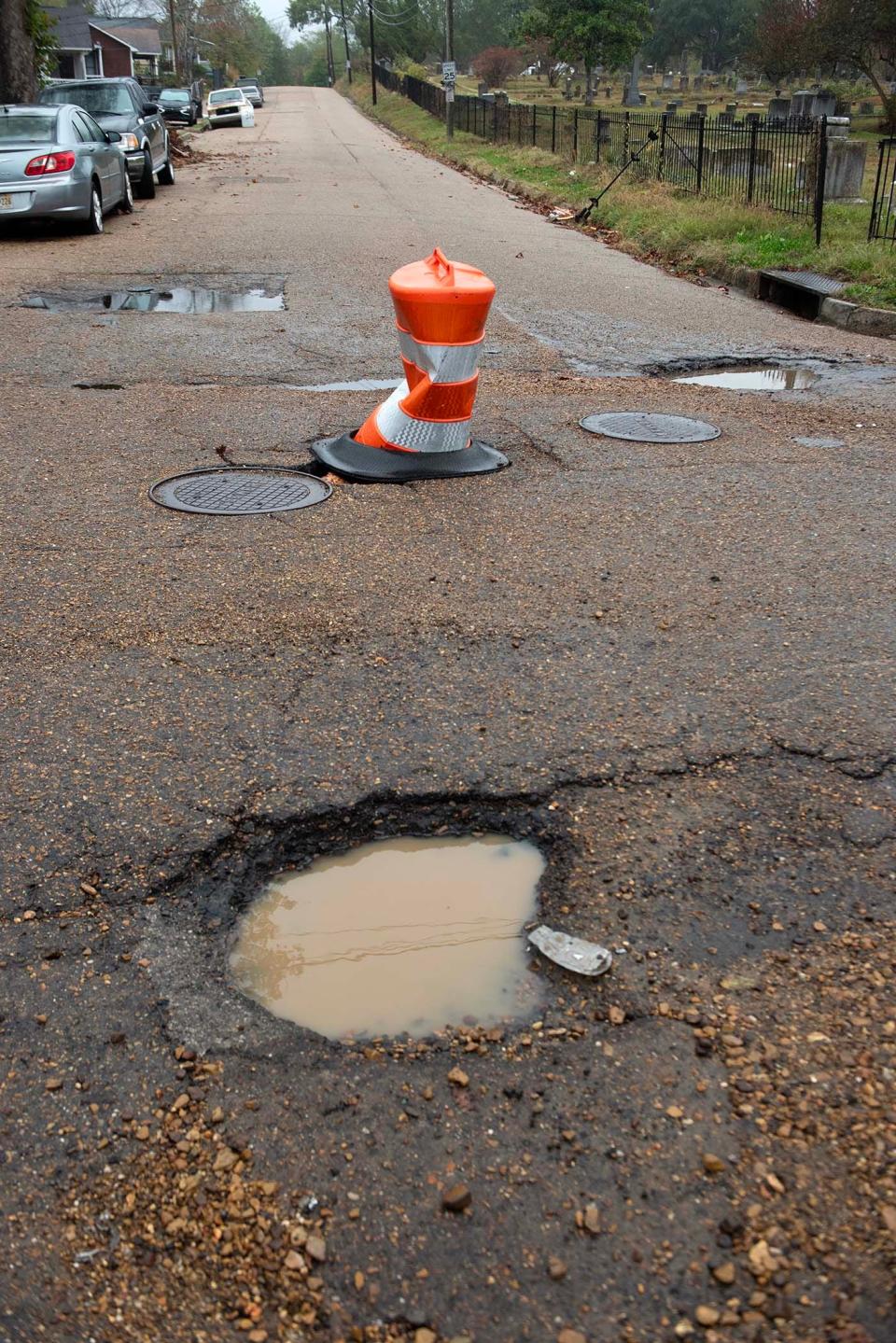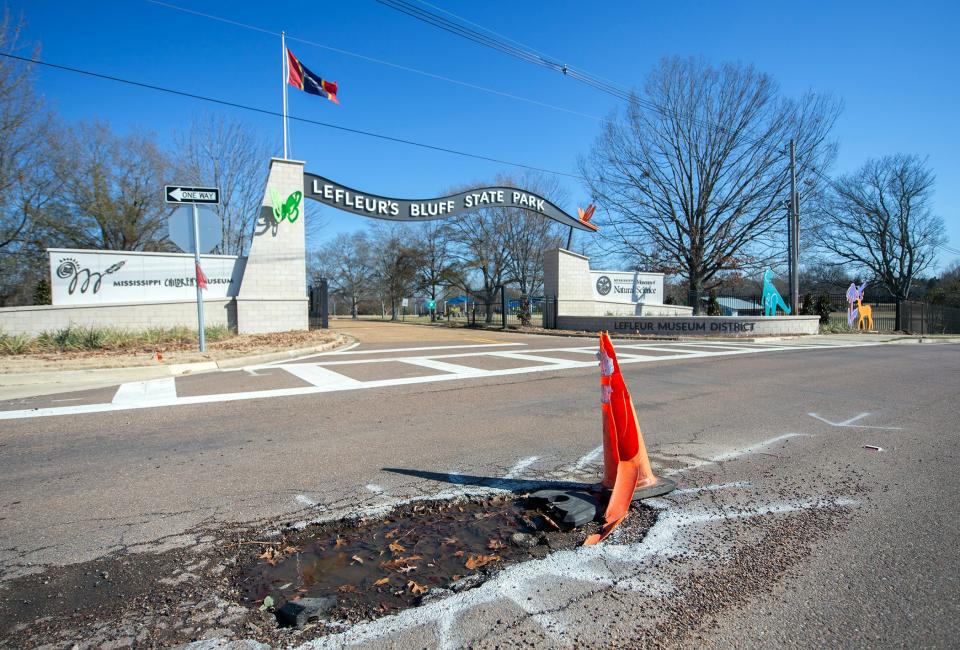Why are there so many potholes, dips and humps in MS roads? | Curious Mississippi answers
Editor's note: This is the debut of Curious Mississippi, a service to the readers of the Clarion Ledger. Readers can submit questions by email to [email protected] and editors will pick out the best and reporters will answer them in an upcoming edition.
Reader question No. 1: Why are there dips and humps in roads in Mississippi?
The conditions of Mississippi's roads have everything to do with the soil underneath. In Jackson and throughout Central Mississippi, one soil can be blamed for most of the dips and humps in the roads — Yazoo clay.
A majority of the Yazoo clay deposits can be found in ― wait for it — Yazoo County, as well as northeast Hinds County, through Madison County, Rankin County, Scott County and all the way to the state line.

"Central Mississippi, particularly the tri-county area, sits on top on top of a type of clay soil called Yazoo clay, a type of highly expansive clay soil that expands when water is added and contracts when water is withdrawn," said Robert Lee, Jackson's city engineer and interim director of the Department of Public Works.
The public works staff, with Lee in-charge, maintains the city's infrastructure, such as bridges, traffic lights, stormwater management and, of course, streets. Lee has been battling the Yazoo clay for years now, which is responsible for most of Jackson's extensive road problems.
MDOT preps for freeze: MDOT official say the department is preparing for extreme polar weather ahead
2024 freeze in Jackson: Jackson weather and water update: Hard freeze coming. How many remain with out water?
Highways across the state are handled by the Mississippi Department of Transportation. Griffin Sullivan, MDOT's state materials engineer, who is responsible for testing soils throughout Mississippi, agreed with Lee.
"It has everything to do with water. High-volume change soils, when they're exposed to moisture will actually swell up like a sponge and that would cause a hump in the road," Sullivan said. "Then vice-versa, in drought conditions these soils will change volume again and they'll actually shrink and that will cause a dip in the road."
Unusually rainy seasons or exceptional droughts, like the one the state faced this past summer, create a lot of movement in the soils.
"It's really a cycle and that cycle just continues depending on the amount of rainfall that happens or the amount of rainfall that doesn't happen," Sullivan said.

Engineers can try to dig out the clay and replace it with a higher quality soil, but that can be difficult because a lot of Yazoo clay soil deposits are hundreds of feet deep. They can also try to treat the soil chemically with hydrated lime, which hardens the clay and stabilizes it before building roads on top of it.
"You can't really get rid of the clay, so you just have to mitigate it as best you can," Sullivan said.
MDEQ's environmental fines: Which MS companies and cities faced environmental fines in November?
Reader question No. 2: Does the City of Jackson have pothole repair machines that are inoperative, and do they have trained personnel that know how to operate these vehicles?
According to Lee, the city purchased a pothole repair machine years ago that used a tar-and-slag mix, a common material used to fill potholes. But long-term use determined the machine was not ideal for three main reasons:
The pothole-repair machine had repeated maintenance issues with the tar-and-slag system that limited its use.
Asphalt is a much better material to fill potholes, which the machine didn't use.
The tar-and-slag material had to be purchased from a vendor in Vicksburg, causing further delays, whereas there are multiple plants in Jackson where the city can purchase asphalt.
"Based on our experience, the tar-and-slag pothole repair machine was not an improvement over more traditional pothole repairs," Lee said.
Look at this pothole in Jackson: Weeding out the problem: 6-foot ragweed plant grows out of pothole in west Jackson
Upkeep of the city's streets is the job of the Paved Streets Division, which is currently facing a staff shortage like most of the city's departments. Lee said patching streets and filling potholes "is only a Band-Aid for these streets," and most need to be totally repaved.
In October, the Jackson City Council voted to approve phase one of the city's "Street Resurfacing Project," which is repaving a total of 31 neighborhood streets in Ward 3 and Ward 7. Deciding what streets are next for the project is the job of the One Percent Sales Tax Commission. The commission uses 1% of tax revenue earned by sales tax — about $12 to $13 million per year — to fund capital improvement projects.
Know of any other infrastructure issues in Jackson? Contact Charlie Drape at [email protected].
Curious Mississippi answers burning questions about life in Jackson and Mississippi. Email your questions to [email protected]
Support local journalism by subscribing to the Clarion Ledger and see some of the benefits of being a subscriber.
This article originally appeared on Mississippi Clarion Ledger: Why are Mississippi roads so bad, filled with dips and humps?
Solve the daily Crossword

